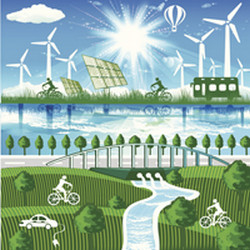Travelling exhibition on renewable energy
Renewable energy is one of the most pivotal science topics of our time, captivating the interest of citizens across Europe. It implies greener cities, cleaner transport and healthier lives for everyone, representing a much coveted vision with tremendous social and economic implications. In this vein, science centres and science museums can play an important role in disseminating the latest on this intriguing topic. With this goal in mind, the EU-funded project 'European network of science centres in communicating energy-related topics' (SCICOM) explored different innovative ways to disseminate information on renewable energy to the public. The project team worked fervently on strengthening science centres and museums in Europe through a number of ways. They built partnerships among institutions that host science exhibitions and established a network of science centres that emphasise and showcase energy topics. Most importantly, the team developed the idea of a travelling exhibition, dubbed Energy Island. This exhibition focussed on presenting the advantages of renewable energy to the public in easily understandable concepts. Several workshops within the newly established network and the publication of a joint policy paper on communicating renewable energy topics supported this endeavour. The exhibition began in Rome, Italy during November 2009 and moved to cities in Estonia, France, Germany, Switzerland and the UK. It was viewed by over 300 000 people attracting significant attention and proving very popular among the public. Although the project has ended, the team has ensured that Energy Island can still be rented to other museums and science centres for a certain time beyond the project's completion. Not only did the exhibition engage and educate the public and particularly young people, it also involved policymakers, civil society organisations and other key stakeholders. By spreading this knowledge to the public, the project reinforced the knowledge economy and encouraged a future that embraces energy savings and renewable energy.



